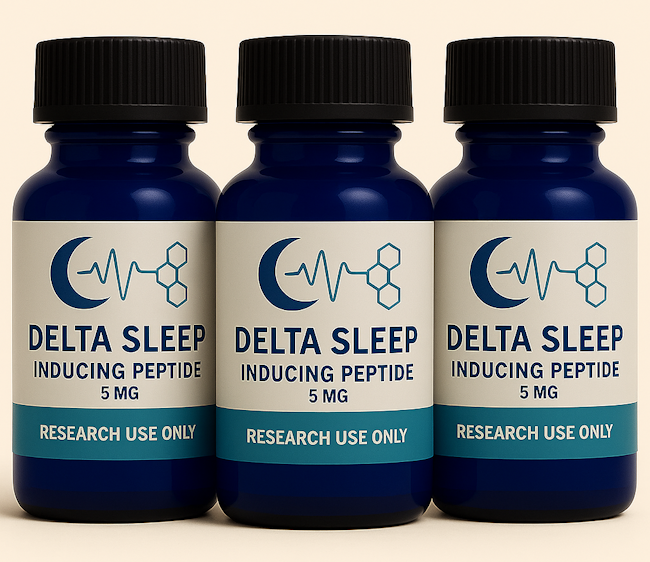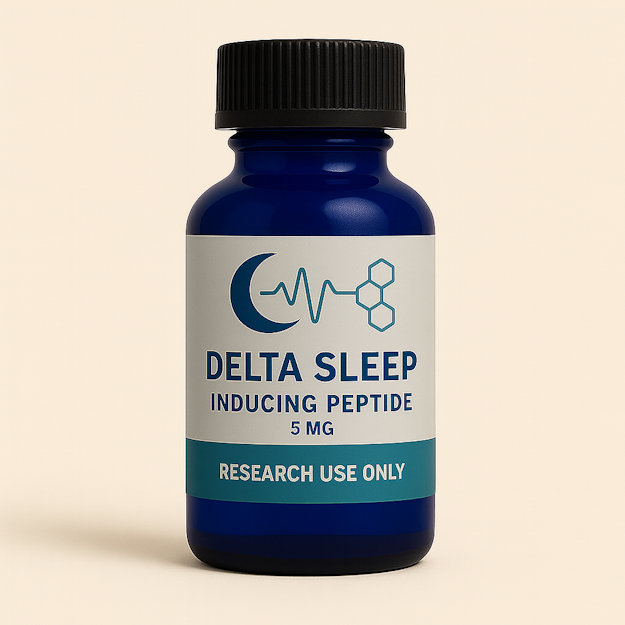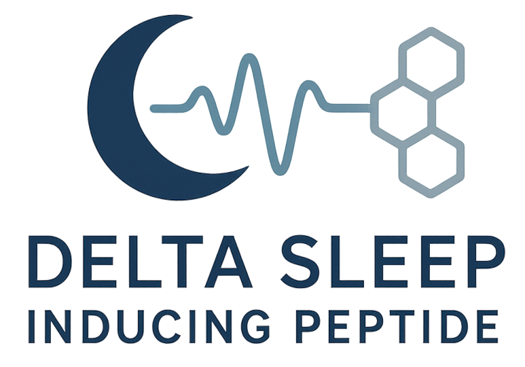Delta Sleep Inducing Peptide (DSIP): Exploring the Science of Sleep Optimization

The delta sleep inducing peptide, Delta Sleep Inducing Peptide (DSIP), is a fascinating neuropeptide that has captivated sleep researchers, clinicians, and biohackers alike. Originally isolated from rabbit brain tissue in the 1970s, this sleep inducing peptide has demonstrated remarkable potential in modulating sleep architecture, especially in promoting slow wave sleep (SWS) and improving overall sleep regulation. With increasing interest in solutions for insomnia, sleep deprivation, and disrupted circadian rhythm, DSIP stands out as a compelling candidate for therapeutic and experimental applications.
In this comprehensive article, we’ll dive deep into the molecular mechanisms of DSIP, its role in neuroendocrine function, and the evolving body of research surrounding its effects on delta sleep, stress, emotional regulation, and even conditions like Alzheimer’s disease and sleep apnea, including one study that highlights its significance.
What Is Delta Sleep Inducing Peptide (DSIP)?
Delta Sleep Inducing Peptide (DSIP) is a naturally occurring peptide comprised of nine amino acids. It was initially discovered in rabbit brain extracts during experiments aimed at identifying a sleep promoting substance capable of triggering delta sleep, which is characterized as the deepest, most restorative stage of non-REM sleep. DSIP’s sequence has since been synthesized in laboratories and studied for its profound sleep inducing properties.
The sleep inducing peptide DSIP exhibits effects across multiple biological systems. Beyond influencing the brain, it impacts peripheral organs, neuroendocrine function, and even blood pressure. Studies have demonstrated its presence in human plasma, cerebrospinal fluid, and various tissues, although human plasma DSIP decreases during prolonged sleep deprivation.
DSIP and Delta Sleep: Understanding the Connection
The term delta sleep refers to the phase of slow wave sleep, during which brain activity slows down significantly. This phase is critical for deep sleep, tissue repair, memory consolidation, and hormonal secretion. Numerous studies have demonstrated that DSIP may induce sleep, particularly slow wave or delta sleep, by acting on the brain’s sleep-wake regulatory centers.
Researchers like Kastin AJ, Schoenenberger GA, and Mikhaleva II have extensively explored DSIP’s action on the central nervous system, showing its ability to modulate the circadian rhythm, lower body temperature, and reduce emotional stress. Notably, in experiments conducted at the Russian Academy of Medical Sciences, DSIP administered to rats and rabbits was found to enhance sleep duration and quality, especially during different circadian times.
How Does DSIP Work?
The exact molecular mechanisms by which DSIP exerts its sleep inducing effects remain under investigation. However, DSIP appears to influence NMDA receptors, the MAPK pathway, and various neurotransmitter systems, as highlighted in ongoing research. These pathways are integral to regulating sleep patterns, hormonal secretion, and neuroendocrine function.
One double blind study published in the European Journal of Pharmacology (Eur J Pharmacol) examined DSIP’s ability to alter sleep architecture without disrupting rapid eye movements (REM). Results revealed that small doses of DSIP significantly increased slow wave or sleep inducing delta sleep, reduced stress, and promoted more stable circadian rhythm alignment.
DSIP and Stress Reduction
One of the most intriguing aspects of DSIP is its ability to mitigate stress and support emotional regulation. Chronic stress has a well-documented impact on sleep, especially among chronic insomniac patients. By reducing levels of emotional stress and stabilizing the body’s circadian rhythm, DSIP helps restore normal sleep patterns.
The potent antinociceptive effect of DSIP observed in the rat brain also supports its use in managing stress-induced insomnia. In fact, studies involving recipient rabbits and mice show that DSIP may play a role in reducing heart rate, lowering blood pressure, and improving recovery from emotional stress.
DSIP and Sleep Disorders
In clinical settings, DSIP is being explored for its potential role in treating sleep apnea, insomnia, and sleep deprivation. Sleep apnea, which disrupts the body’s ability to maintain steady sleep architecture, may benefit from DSIP’s ability to support continuous slow wave sleep. Likewise, insomnia may be alleviated through DSIP supplementation.
Although not yet approved as a standard treatment, DSIP and other peptides are considered a promising sleep promoting substance in experimental medicine. Its role in correcting imbalances in sleep regulation and reducing stress makes it a valuable peptide for future therapeutic interventions.
Clinical Evidence: Notable Studies on DSIP
Several landmark studies have shaped our understanding of DSIP and its sleep inducing capabilities:
- Kovalzon VM conducted animal research demonstrating that DSIP administration led to prolonged delta sleep and reduced stress in laboratory rats.
- Honda Y and Usui S published findings showing DSIP’s ability to improve sleep patterns and regulate neuroendocrine function in both animal models and human subjects.
- Friedman TC and Coy DH examined DSIP’s influence on circadian rhythm, observing that sleep inducing peptide DSIP is more effective when administered at specific circadian times.
Multiple studies cited in the European Journal, including work by Charnay et al, have confirmed DSIP’s efficacy as an inducing peptide capable of improving delta sleep, enhancing deep sleep, and optimizing sleep regulation.
DSIP and Neuroendocrine Function
DSIP has a unique impact on neuroendocrine function, including its modulation of hormones related to sleep activation, stress, and body temperature. Its effects extend to peripheral organs and tissues, where it helps synchronize biological processes to the circadian rhythm.
In studies by Kastin AJ and the Russian Academy, DSIP was shown to enhance the production of melatonin and reduce cortisol levels, thereby facilitating deep sleep and decreasing stress. These findings suggest a dual action: DSIP, a potent inducing peptide, not only helps induce sleep but also stabilizes hormonal secretion necessary for health and recovery.
Curious how DSIP’s hormone-balancing effects differ from other neuroactive peptides? Explore our in-depth analysis of Selank dosage and neuroendocrine regulation for additional insight.
Applications in Biohacking and Performance Optimization
Due to its natural origin and sleep inducing properties, DSIP has attracted interest from the biohacking community. It’s often used in small doses at night to promote delta sleep, combat emotional stress, and improve sleep patterns. Anecdotal reports suggest that DSIP helps users wake up feeling more refreshed, even after shorter durations of sleep.
Additionally, DSIP’s ability to improve neuroendocrine function and reduce stress may indirectly support athletic recovery, mood regulation, and cognitive performance. Its presence in human plasma and rat brain, possibly from a bacterial origin, provides evidence of its endogenous function, suggesting it may work with the body’s natural sleep regulation systems.
DSIP in Aging and Cognitive Health
New lines of research are examining DSIP’s role in Alzheimer’s disease and cognitive aging. Disruptions in sleep architecture and circadian rhythm are commonly observed in Alzheimer’s patients. Because DSIP enhances delta sleep, it may help preserve cognitive function by supporting deep sleep, which is crucial for clearing amyloid plaques in the brain.
Although more clinical research is needed, Early studies in mice and rats indicate that DSIP may slow cognitive decline by improving sleep regulation, reducing stress, and supporting normal neuroendocrine function, potentially through induced mechanisms.
Challenges and Future Research
Despite promising findings, the clinical use of DSIP is still in its early stages. Many studies have focused on animal models, and results may not fully translate to human populations. Additionally, questions remain about DSIP’s half life, dosage, and ideal delivery method.
Future research will need to explore:
- Long-term safety in patients
- Mechanisms of action in the brain
- Interaction with NMDA receptors
- DSIP behavior in cerebrospinal fluid
- The influence of different circadian times on its efficacy
With ongoing work by institutions like the Russian Academy, researchers like Mikhaleva II, and continued interest in peptides by scientists such as Schoenenberger GA, the future of DSIP as a sleep inducing peptide remains bright.
Frequently Asked Questions
Q: What does Delta Sleep Inducing Peptide do?
Delta Sleep Inducing Peptide (DSIP) is a naturally occurring sleep inducing peptide known for its ability to induce sleep, particularly by promoting slow wave sleep (also known as delta sleep). It plays a role in optimizing sleep architecture, reducing emotional stress, and stabilizing the circadian rhythm. DSIP influences neuroendocrine function, helping regulate hormones like melatonin and cortisol, which are crucial for sleep regulation. Research involving rats, rabbits, and human trials has demonstrated DSIP’s effectiveness in enhancing deep sleep, lowering body temperature, and reducing sleep deprivation symptoms.
For readers comparing sleep-enhancing compounds, see our full breakdown of peptides for sleep that includes DSIP, CJC-1295, and Sermorelin.
Q: What is the best peptide for sleep?
While there are several peptides under investigation for sleep enhancement, Delta Sleep Inducing Peptide (DSIP) is widely regarded as one of the best peptides for improving sleep patterns, especially in individuals with insomnia or disrupted circadian rhythms. Its natural presence in human plasma, ability to enhance delta sleep, and proven influence on stress make it a standout sleep promoting substance. Other peptides like Selank and Epitalon also show promise, but DSIP is uniquely associated with direct improvements in sleep induction, neuroendocrine function, and slow wave sleep.
Q: What peptides make you sleepy?
Peptides that exhibit sleep inducing properties include:
- Delta Sleep Inducing Peptide (DSIP) – promotes delta sleep, regulates circadian rhythm, and supports deep sleep.
- Selank – a synthetic peptide with anxiolytic effects, which may help initiate sleep by reducing stress and emotional tension.
- Epitalon – may improve sleep architecture and influence melatonin secretion.
However, among these, DSIP remains the most extensively researched for its ability to consistently induce sleep and regulate natural sleep patterns.
Q: Is DSIP peptide safe to take?
Current studies suggest that DSIP peptide is well-tolerated in both animal and limited human trials. When administered in small doses, DSIP has not shown significant toxicity or adverse effects. Its natural occurrence in the brain, human plasma, and peripheral organs supports its safety profile. However, since DSIP is still primarily considered an experimental sleep inducing peptide, long-term clinical safety data in patients is limited. As with any sleep promoting substance, individuals should consult healthcare professionals before using DSIP for sleep regulation or managing insomnia.
Conclusion
The Delta Sleep Inducing Peptide (DSIP) represents a powerful tool in the ongoing quest to better understand and regulate sleep. With its natural presence in human plasma, proven ability to induce sleep, reduce stress, and improve neuroendocrine function, DSIP has wide-ranging potential applications for treating insomnia, optimizing sleep architecture, and supporting cognitive and emotional well-being.
As scientific research continues to unravel the molecular mechanisms behind this potent inducing peptide, DSIP may very well emerge as a breakthrough in both clinical and lifestyle-based approaches to achieving better sleep.
To understand how DSIP compares with other restorative peptides, check out our guide on DSIP peptide nasal spray and how delivery method impacts sleep optimization.
Understanding Delta Sleep Inducing Peptide
Discover in-depth insights on Delta Sleep Inducing Peptide, revealing its mechanisms, benefits, and essential facts to empower your sleep health journey.

Discover the Science of Better Sleep
A concise overview of delta sleep inducing peptide’s key effects and its role in improving sleep quality.
Promotes Deep Restorative Sleep
Enhances natural sleep cycles by encouraging longer periods of deep, restorative sleep for improved wellbeing.
Supports Brain Recovery
Facilitates neural repair and cognitive restoration, helping users wake refreshed and mentally sharp.
May Reduce Sleep Disorders
Shows potential in easing symptoms of insomnia and other sleep disruptions, promoting healthier sleep patterns.

